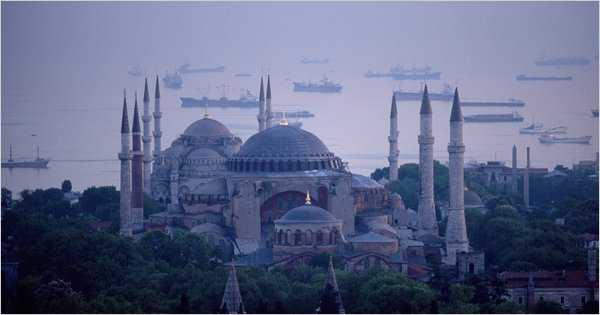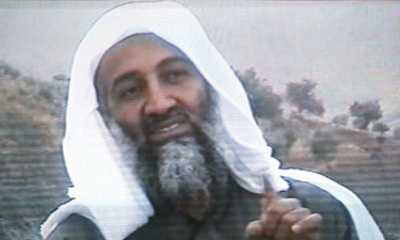WISPS OF THE PAST Beyond Istanbul’s landmarks, a legacy of cosmopolitan interchange of goods and ideas.
By ANTHONY SHADID
Published: May 28, 2011
GAZIANTEP, Turkey
LESS than a mile from the Syrian frontier, in the land of Kemal Ataturk, Ahmed Sheikh Said defies the identities that borders inspire.

Mr. Said was born in the Syrian town of Azaz and raised across a line on the map in Kilis, Turkey. A grocer, he speaks Turkish like a native to his customers, while holding an ear open to the Arabic telecasts of Al Jazeera playing in his store. His wife and his mother are Turkish, but Arab blood runs through his veins, he says, “till the end of time.”
“The bread of Azaz comes from Kilis, and the bread of Kilis comes from Azaz,” said Mr. Said, whose shop sits just off a road that once carried the business of the far-flung Ottoman Empire and now marks Turkey’s limits. “We’re the same. We’re brothers. What really divides us?”
As the Arab world beyond the border struggles with the inspirations and traumas of its revolution — a new notion of citizenship colliding with the smaller claims of piety, sect and clan — something else is percolating along the old routes of that empire, which spanned three continents and lasted six centuries before Ataturk brought it to an end in 1923 with self-conscious revolutionary zeal.
It is probably too early to define identities emerging in those locales. But something bigger than its parts is at work along imperial connections that were bent but never broken by decades of colonialism and the cold war. The links are the stuff of land, culture, history, architecture, memory and imagination that remains the realm of scholarship and daily lives but often eludes the notice of a journalism marching to the cadence of conflict.
Even amid the din of the upheaval in the Arab world, that new sense of belonging represents a more pacific and perhaps more powerful undertow pulling in directions that call into question more parochial notions. The undertow intersects with the Arab revolution’s search for a new sense of self; it also builds on economic forces now reconnecting an older imperium, as well as on Turkey’s new dynamism and on efforts to bring reality to what has long been nostalgia.
Its echoes are heard in the borderlands like Gaziantep, near Mr. Said’s shop, where businessman can haggle in a patois of English, Turkish, Arabic and even Kurdish. It is seen in the blurring of arbitrary lines where the Semitic script of Arabic and Kurdish tangles with the Latin script of Turkish across the borders with Syria and Iraq. It is noticed along the frontiers where Arab and Turkish nationalism, pan-Islamism and a host of secular ideologies never seemed to quite capture the ambitions or demarcate the environments of the diverse peoples who live there.
“The normalization of history,” proclaims the Turkish foreign minister, Ahmet Davutoglu, whose government has tried to reintegrate the region by lifting visa requirements and promoting a Middle Eastern trade zone, as it deploys its businessmen along the old routes and exports Turkey’s pop culture to an eager audience.
“None of the borders of Turkey are natural,” he went on. “Almost all of them are artificial. Of course we have to respect them as nation-states, but at the same time we have to understand that there are natural continuities. That’s the way it’s been for centuries.”
There is admittedly a hint of romanticism in it all. The Arab world may in fact be bracing for years of sectarian and internecine strife in places like Yemen, Bahrain, Libya and Syria. And in seeking to be a more prominent, and steadying, influence, Turkey’s ambitions may well be greater than its means. Still, economic realities are already restoring old trajectories that joined the Kurdish regions of Turkey and Iraq, tied Batumi in Georgia to Trabzon in Turkey, and knit Aleppo into an axis of cities — Mosul, Diyarbakir, Gaziantep and Iskenderun — in which Damascus, the leading but distant Arab metropole, was an afterthought.
THE DRAWING OF 20TH-CENTURY BORDERS rendered traumas large and small. Sectarian and ethnic cleansing after World War I rid Turkey and Greece of much of their diversity. The horrors of nationalism and the Holocaust made Salonica, a celebrated melting pot, unrecognizable in its modern incarnation. Even history’s footnotes were rewritten.
One example is Marjayoun, my family’s ancestral hometown in Lebanon, nestled near the Israeli and Syrian borders in the heart of the old Ottoman realm, and little more than an afterthought on maps these days.
No one in Marjayoun would necessarily pine for the days of the Ottoman rulers. Massacres occurred, and Jews and Christians faced discrimination in taxes and commerce. There was no such thing as equality. To this day, the darkest moments of Marjayoun’s history remain those last breaths of the empire — the seferberlik. It was the Ottoman name for the draft, but it came to represent the famine, starvation and death that World War I brought to the town, when the famished searched the manure of animals to find an undigested morsel of grain.
Yet more than a few in Marjayoun today might express a nostalgia for the time and place the Ottoman Empire represented, when Marjayoun’s traders ventured to Arish on the coast of the Sinai Peninsula and down the Nile to Sudan, by way of Palestine. The town was a way station on the route from the breadbasket of the Houran in southern Syria to Acre, the Levant’s greatest port on the coast of Palestine. Beirut was an afterthought. Marjayoun’s traders plied the steppe of the Houran, its gentry owned land in the Hula Valley, and its educated ventured to Haifa and Jerusalem to make their reputations.
World War I and the borders that followed augured the demise of this style of life, and not just in Marjayoun. The ideologies that gained prevalence in the town then were about contesting those frontiers — Arab nationalism, pan-Syrian nationalism and Communism, which itself was imagining a broader community. These movements failed as more borders were drawn in wars with Israel in 1948 and 1967. And with those lines on the map came a smaller sense of self. By the time Lebanon’s 15-year civil war began in 1975, ideologies had given way to identities, and most people in Marjayoun identified themselves simply as Christian, or perhaps Greek Orthodox, too unique to survive as a community.
A town of thousands is today a town of hundreds, strewn with the abandoned villas of another age. Hajar bala bashar, a friend once told me. “Stones without people.”
“A RECREATION OF THE HISTORIC AND NATURAL ENVIRONMENT” is how Mr. Davutoglu describes his vision for the region. And indeed, that vision, which is effectively government policy, has touched in a nerve in Turkey, a country with its own unresolved questions of identity.
Just as Arab nationalism still runs run deep, with the fate of Palestine its axis, so does Turkish nationalism, which includes a sense that the country deserves a role in the region, and beyond that at least echoes of its Ottoman age. The more sophisticated Turks dismiss charges of a new rationale for Turkish imperialism and call the goal instead a peaceful partnership that might look like the free-trade zone that presaged the European Union after World War II.
“It’s been almost 100 years that we’ve been separated by superficial borders, superficial cultural and religious borders, and now with the lifting of visas to Jordan, Syria and Lebanon, we’re lifting national boundaries,” said Yusuf Yerkel, a young academic on Prime Minister Tayyip Erdogan’s staff. “Turkey is challenging the traditional understanding of policy in the Middle East in place since the 20th century.”
More than the talk of a salon, the vision comes at an obvious turning point in the Middle East. Though dealt setbacks by the Arab revolution — investments have been lost in Libya and the prospect of chaos stalks Syria — Turkey has stuck to its vision of an integrated region. A railway line linking Turkey, Syria and Iraq reopened last year; a fast train is to operate between Gaziantep and Aleppo. The resources of northern Iraq are strategic for Turkey’s plans to diversify its energy sources and to feed a pipeline from Turkey to central Europe. A common free-trade area has already been agreed upon by Turkey, Syria, Jordan and Lebanon.
Turkish television series are dubbed into Syrian Arabic, and its stars’ posters sell by the tens of thousands in Iraq. In Baghdad, portraits of one famous actor are digitally altered to show him in traditional Kurdish or Arab dress.
Across the region, the Arab revolution has inspired a rethinking of identity, even as older notions of self hang like a specter over the revolts’ success. In its most pristine, the revolution feels transnational, as demands of justice, freedom and dignity are expressed in a technology-driven globalism. It echoes even in Turkey, where religious and national divides are increasingly blurred. Selcuk Sirin, a professor at New York University who has done extensive polling in Turkey, especially among youth, calls this the emergence of “hybrid identities.”
“Young people don’t buy into this idea of a clash, and they don’t buy into this idea of fixed identity,” he said. “They know how to negotiate these so-called polar opposites, and they’re looking for something new.”
THERE WAS A MOVIE more than a decade ago in Turkey called “Propaganda,” a dark comedy about the border drawn between Syria and Turkey, dividing family from family. It was inspired by the reality of relatives heading to the fence there on Muslim holidays — Bayram in Turkish, Id in Arabic — and throwing gifts to the other side.
These days, with the border effectively open, Syrians fill the hotels on weekends in Gaziantep, which is famous for its pistachios. Some merchants here talk about their trade growing tenfold since visa requirements were lifted. Debates rage over whether the kebab of Gaziantep is better than the kibbe in Aleppo.
Turks may still call a mess “Arab hair.” But they also judge a gift by the standards of “apricots in Damascus.” And the old notions of Ottoman tyranny (from the Arab point of view) and Arab betrayal in World War I (as Turks see it) have given way somewhat to the promise of profit in a market still booming even amid the uprising across the border.
Hakan Cinkilic, foreign trade manager of a plastics company called Sun Pet, is reaping the benefits. Nearly 80 percent of its products go to Iraq, and the company set up a factory in Jordan last year. Its exports have more than doubled since 2008. This year he has already traveled to Libya, the United States, Iraq and Saudi Arabia.
As he spoke, his cellphone rang. It was a customer in Kirkuk, Iraq, who spoke to him in Turkish. A few minutes later, a businessman called from the West Bank. The conversation unfolded in English, punctuated by Arabic expressions inflected by the vowels of his native tongue. You wouldn’t call him neo-Ottoman, given the term’s suggestion of a resurgent imperialism. He’s not really Levantine, an identity whose borders hug the Mediterranean coast. He seemed post-Ottoman, reinterpreting the past.
“It’s natural,” he said simply.
via Can Turkey Unify the Arabs? – NYTimes.com.



